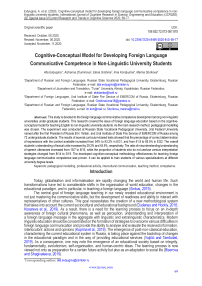Cognitive-conceptual model for developing foreign language communicative competence in non-linguistic university students
Автор: Alla Evtyugina, Aizhanna Zhuminova, Elena Grishina, Irina Kondyurina, Marina Sturikova
Журнал: International Journal of Cognitive Research in Science, Engineering and Education @ijcrsee
Рубрика: Original research
Статья в выпуске: S vol.8, 2020 года.
Бесплатный доступ
This study is devoted to the foreign language communicative competence development among non-linguistic universities under-graduate students. This research covered the issue of foreign language education based on the cognitive-conceptual model for teaching English to non-linguistic university students. As the main research method, pedagogical modelling was chosen. The experiment was conducted at Russian State Vocational Pedagogical University, Ural Federal University named after the first President of Russia B.N. Yeltsin, and Ural Institute of State Fire Service of EMERCOM of Russia among 72 undergraduate students. The results of several curriculum-based tests showed that the percentage of correct determination of expressions with the context available increased from 54% to 93.2% in EG1, and from 41.9 to 85.5% in EG2. The overall students’ understanding of lexical units increased by 39.2% and 43.6%, respectively. The ratio of misunderstanding/understanding of speech utterances increased from 15/7 to 6/16, while the proportion of students who do not use/use various interpretation strategies changed from 8/14 to 3/19. The developed cognitive-conceptual methodology effectiveness for teaching foreign language communicative competence was proven. It can be applied to train students of various specialisations at different university degree levels.
Pedagogical modelling, professional activity, intercultural communication, teaching method, competence
Короткий адрес: https://sciup.org/170198611
IDR: 170198611 | УДК: 159.922.72.072-057.875 | DOI: 10.23947/2334-8496-2020-8-SI-69-77
Текст научной статьи Cognitive-conceptual model for developing foreign language communicative competence in non-linguistic university students
Today, globalisation and informatisation are rapidly changing the world and human life. Such transformations have led to considerable shifts in the organisation of world education, changes in the educational paradigm, and in particular, in teaching a foreign language ( Sinkus, 2019 ).
The central goal of foreign language teaching in our newly created educational environment is not just mastering the communicative skills, but the development of readiness and ability to interact with representatives of other cultures. This goal necessitates the creation of a new methodological system that takes into account the current sociocultural and educational background ( Dudeney and Hockly, 2016 ; Kosareva et al., 2019 ). As a result, there is a need for the learning process to focus on an in-depth awareness of foreign cultural phenomena, as well as perception, understanding and interpretation of a foreign language message in the aggregate with linguistic and extralinguistic characteristics. Modern linguistic education should be concentrated on the formation of strategies to overcome various difficulties in foreign language communication and provide the ability to analyse and evaluate the received information, interlocutors’ actions and opinions ( Kuprina et al., 2019 ). The emergence of post-non-classical education, characterising the current educational system in Russia, is taking place against the backdrop of changes in the educational paradigm and in the way of providing educational services ( Vujičić and Tambolaš, 2019 ). As a consequence, one may note the emergence of an educational society based on integrity, fundamentality, evolutionism, self-organisation, and human-centric ideas. The learning process is now viewed not only as preparation for a certain future activity but also as an adaptation to social life ( Biserova and Shagivaleeva, 2019 ).
The current study introduces the concept of ‘cognitive-conceptual model.’ Throughout this paper, this term will refer to an integral model focused on the formation of the multicultural personality of a student as a subject of foreign language communication. In addition, the cognitive-conceptual model is aimed at teaching students how to adequately interpret sociocultural realities in a foreign language context and communicate with a representative of another culture, while bearing in mind the peculiarities of his/her perception of the world. The novelty of this study lies in an attempt to solve complex issues of the synergy of functional characteristics of foreign language communication in connection with the development of educational paradigm, based on the perception of speech as a process carried out by neurophysiological structures ( Ud Din and Akhlaq, 2019 ).


